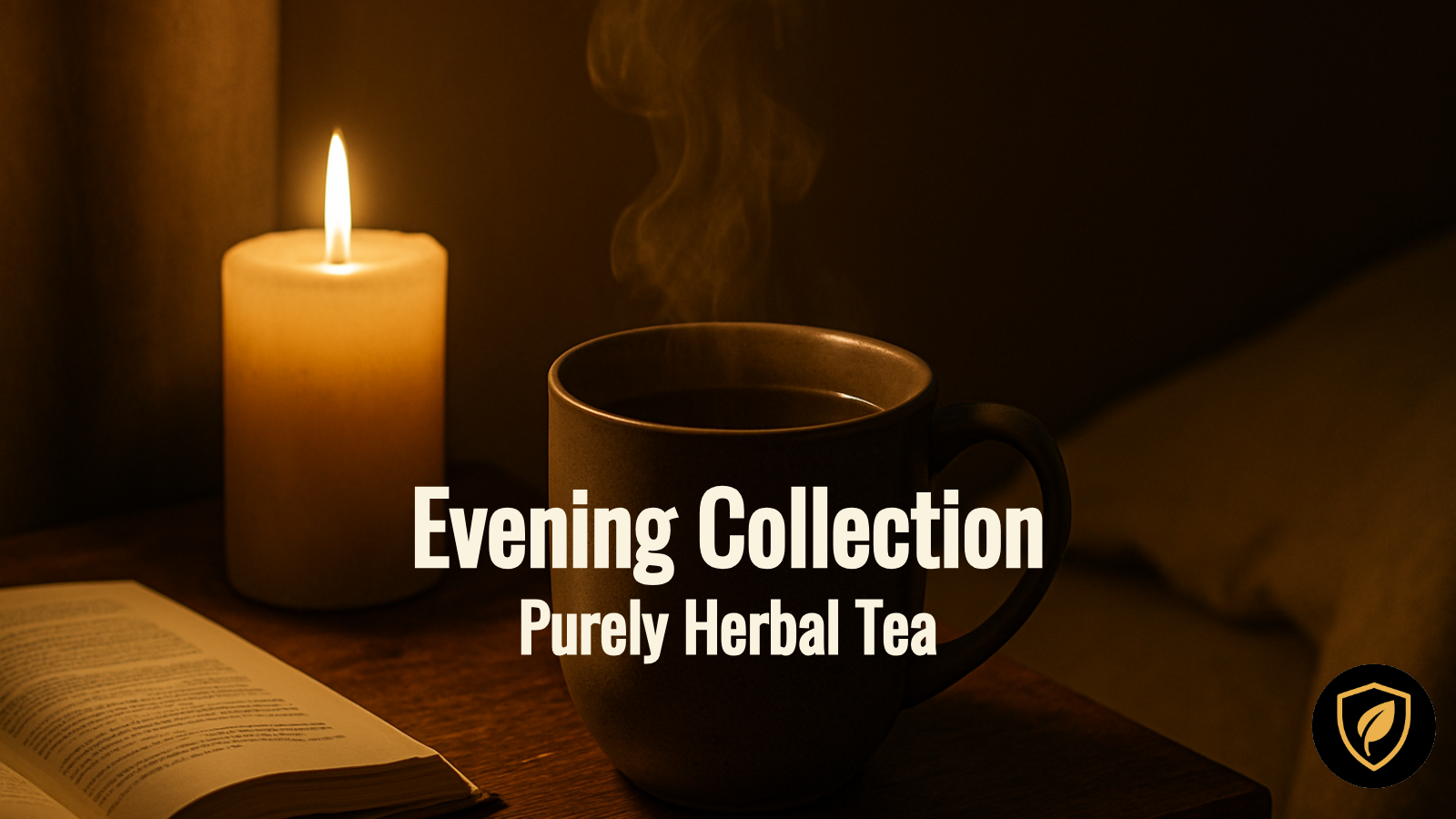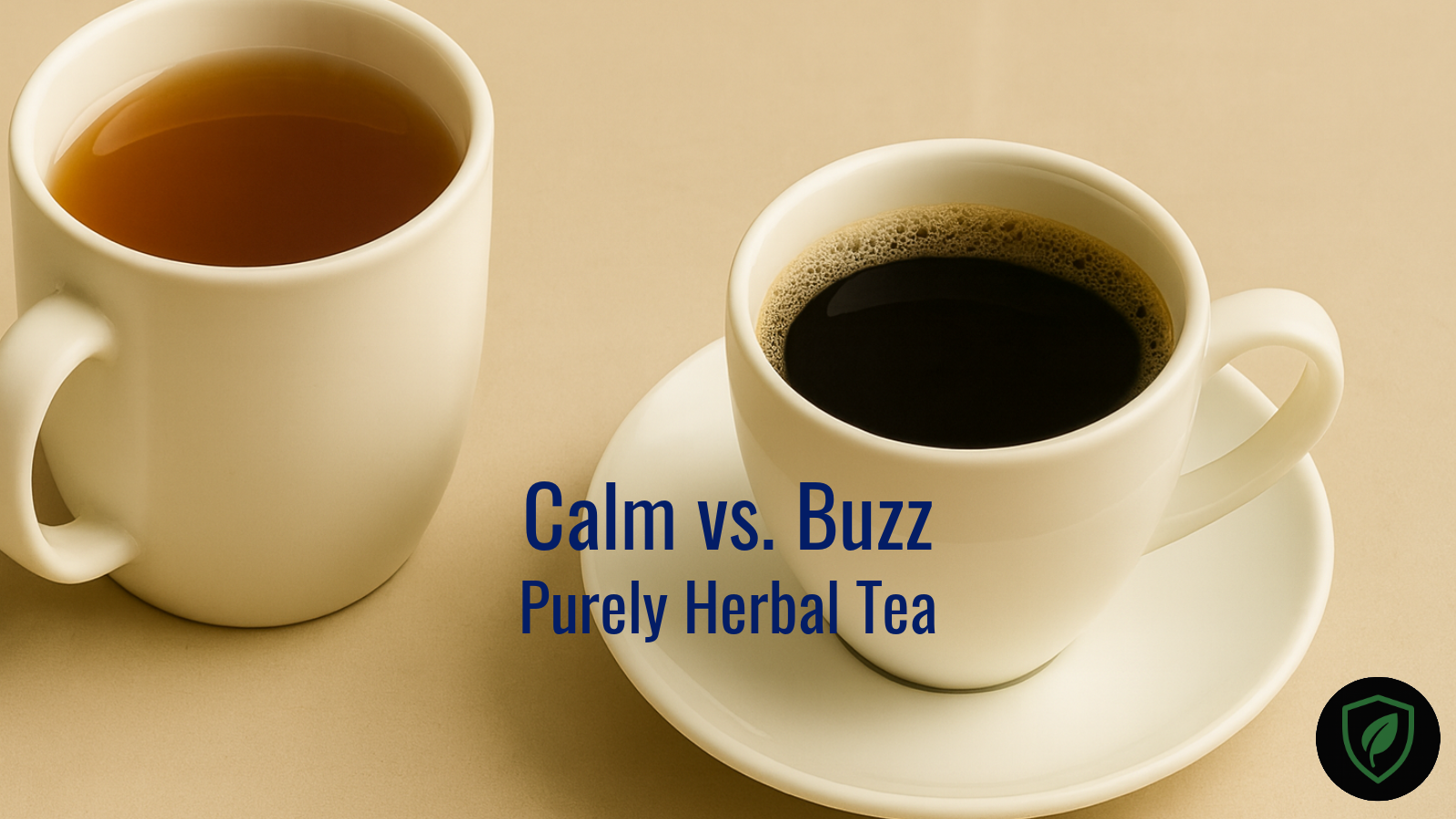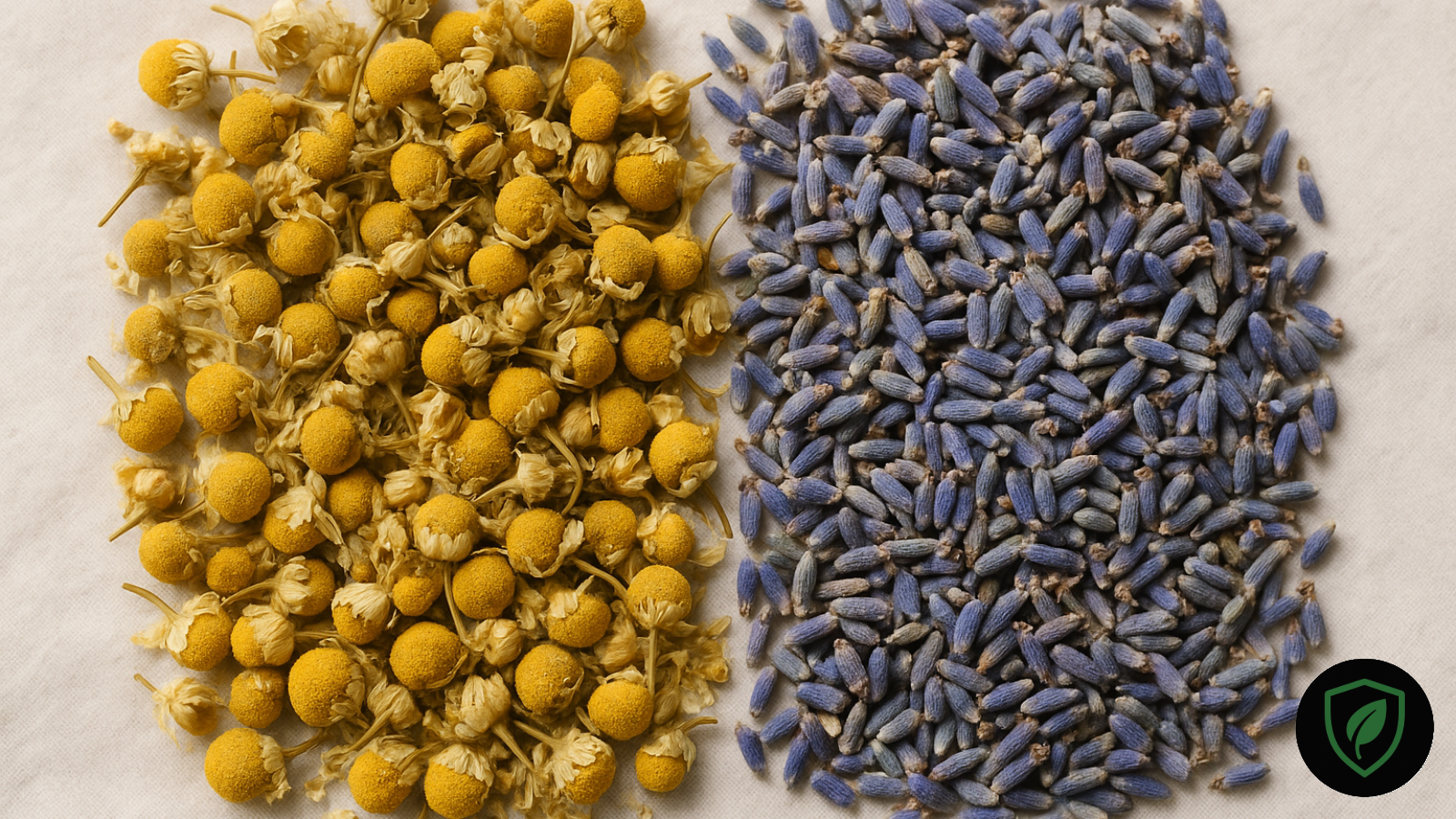
Evening Herbal Tea Rituals for Better Sleep & Stress Relief
The day fades, but your mind does not. Thoughts tumble over each other, your body still hums with the tension of meetings, errands, and screens, and the idea of deep, restful sleep feels out of reach. We live in a world that glorifies productivity long after the sun has set, yet the body longs for stillness.
This is where ritual transforms the ordinary into something sacred. An evening ritual is not just about getting ready for bed—it is about telling your nervous system, “You are safe, you can let go.” And at the heart of this practice is a simple, ancient companion: herbal tea.
From ancient Egypt to the hills of Provence, from monastery gardens to modern kitchens, herbal infusions have been trusted for their ability to calm, soothe, and restore. Tonight, with Purely, we invite you to reclaim the end of your day—not with force, but with presence. With a cup in hand, the transition from day to night becomes less about shutting down and more about coming home. For a seasonal daytime counterpart, see our previous pillar, Best Herbal Teas for Immunity This Fall (Defense in a Cup).
Why Evening Rituals Matter
There’s a quiet difference between a routine and a ritual. A routine is mechanical—you brush your teeth without thinking. A ritual is alive with intention. It’s the way you dim the lights, light a candle, or gently measure loose-leaf herbs into your teapot. A ritual is not about habit alone—it’s about presence.
Science affirms what ancient traditions have always known: rituals cue the nervous system. They lower cortisol, align us with circadian rhythms, and prepare the mind and body to rest. Neuroscientists call this “conditioned relaxation”—a series of familiar cues that whisper to the body: now is the time to slow down.
When you choose to prepare tea each evening, you aren’t just making a beverage. You are practicing a sacred rhythm, reinforcing that sleep is not an afterthought but a natural, restorative close to the day. Learn more in Why Daily Rituals Matter.
The Science & Spirit of Herbal Tea for Sleep
Herbal tea is a bridge between the measurable and the mystical. On one hand, its botanicals contain compounds that modern science can analyze. On the other, they carry centuries of cultural meaning—gifts from the earth that generations have trusted.
Calming herbs are often rich in flavonoids, terpenes, and antioxidants. Chamomile’s apigenin binds to receptors in the brain, easing anxiety. Lavender’s linalool soothes heart rate and blood pressure. Valerian root interacts with GABA, the neurotransmitter that signals sleep. Passionflower supports sleep cycles by regulating nervous system pathways. These aren’t pharmaceuticals—they are gentle, non-habit-forming supports that harmonize with your body.
But beyond molecules, herbal tea has always held spiritual weight. Monks sipped lemon balm to steady the spirit in cloisters. Indigenous healers infused passionflower in ceremonies of rest. Rooibos, gathered in South Africa for centuries, was a communal symbol of evening gathering. To drink herbal tea at night is to join hands with traditions across the globe that valued rest as much as work. For a broader mindset guide, explore Daily Rituals That Create Clarity, Calm, and Balance.
The 7 Calming Herbs for Better Sleep
Chamomile — The Ancient Comfort
In ancient Egypt, chamomile was dedicated to the sun god Ra, used for peace as well as healing. Its name comes from the Greek “chamaimelon,” meaning “earth-apple,” a nod to its delicate apple-like aroma. Across Europe, chamomile became the bedtime tea of choice, passed down through generations as a gentle invitation to sleep. With apigenin binding to brain receptors, chamomile reminds the nervous system to soften. Curious how it stacks up against its aromatic cousin? Read our sibling guide Chamomile vs Lavender.
Lavender — The Soothing Bloom
Romans scented their baths with lavender, believing its fragrance brought purity and calm. Monasteries planted lavender along cloisters, its purple spikes a signal of peace. Today, lavender tea still carries that legacy, lowering perceived stress and easing anxiety. Its linalool-rich oils float upward with the steam, inviting you to breathe deeply and surrender to the quiet.
Valerian Root — The Deep Restorative
Hippocrates described valerian as a root of healing, and Galen prescribed it for sleeplessness nearly 2,000 years ago. Earthy, musky, and powerful, valerian root interacts with GABA pathways much like pharmaceutical sleep aids, but in a gentler, plant-based way. Brewed into tea, it anchors the restless into deeper rest—more than sleep, it offers restoration.
Lemon Balm — The Spirit Lifter
Monks in the Middle Ages called lemon balm the “elixir of life.” Cultivated in monastery gardens, it brightened mood, eased melancholy, and calmed nervous tension. Belonging to the mint family, lemon balm carries citrusy, uplifting notes that prepare the body for rest while lightening the heart.
Passionflower — The Sacred Vine
Native to the Americas, passionflower was revered by Indigenous peoples for its calming and spiritual qualities. When introduced to Europe, missionaries gave it the name “passion flower” for its symbolic blossoms. In modern herbalism, it’s a quiet but powerful ally, promoting relaxation and supporting sleep efficiency.
Ashwagandha — The Resilience Root
In Sanskrit, “ashwagandha” means “smell of the horse,” symbolizing strength and vitality. For over 3,000 years, it has been a cornerstone of Ayurveda—not as a sedative, but as an adaptogen that helps the body adapt to stress. By steadying cortisol, ashwagandha prepares the “tired but wired” for true rest.
Rooibos — The Grounding Cup
Beneath the mountains of South Africa, Indigenous communities have gathered rooibos for centuries, brewing its reddish leaves into calming evening infusions. Naturally caffeine-free and rich in antioxidants, rooibos grounds without sedation and makes a smooth base for stronger calming herbs.
How to Build a Restful Evening Herbal Tea Ritual
A ritual doesn’t have to be elaborate to be powerful. In fact, the simplest rituals are often the most transformative, because they can be repeated night after night without effort. Your evening ritual is not about perfection—it’s about presence.
- Set the Scene. Dim harsh overhead lights. Light a candle, or switch on a warm lamp that casts a soft glow—your first cue that the day is ending.
- Prepare Your Tea. Select your herbs with care—perhaps chamomile for floral comfort or valerian for deeper rest. Let measuring, boiling, and steeping become a meditation.
- Pair with Reflection. While the tea steeps, journal, write three gratitudes, or sit quietly. The cup is an anchor for mindfulness.
- Step Away from Screens. Blue light disrupts melatonin. Keep phones and laptops out of your ritual space.
- Engage the Senses. Diffuse a drop of lavender oil, stretch gently, or play calming instrumentals. Multi-sensory rituals create stronger relaxation cues.
This is the essence of a seasonal tea ritual: ordinary steps elevated through intention. When you want a no-guesswork path, explore our Evening Ritual Collection.
Lifestyle Practices to Enhance Sleep
- Consistent Bedtime. Sleep at the same time nightly to train your circadian clock. Pair with tea so your body anticipates rest.
- Light Management. Lower lights in the evening; embrace bright light in the morning to reinforce melatonin/cortisol rhythms.
- Gentle Movement. Restorative yoga or light stretching releases tension before your warm cup.
- Mindfulness or Prayer. Still the mind as you soothe the body; tea provides the pause to enter that state.
- Gratitude Practice. Reflecting on small joys lowers stress and sets a kinder tone for sleep.
Evening Ritual Recipes
Chamomile–Lavender Drift
Ingredients: 1 tsp chamomile, 1 tsp lavender, 1 tsp lemon balm, 8–10 oz hot water
Method: Steep 7–9 minutes, covered.
Why it works: Chamomile comforts, lavender soothes the heart, lemon balm brightens while calming. For a deeper dive into core florals, see Chamomile vs Lavender.
Valerian–Lemon Balm Calm
Ingredients: 1 tsp valerian root, 1 tsp lemon balm, 0.5 tsp passionflower, 8–10 oz hot water
Method: Steep 8–10 minutes; valerian benefits from a longer steep for stronger effect.
Why it works: Valerian anchors into deep rest, lemon balm lifts melancholy, passionflower steadies the nervous system.
Rooibos–Passionflower Glow
Ingredients: 1.5 tsp rooibos, 1 tsp passionflower, 0.5 tsp ashwagandha, 8–10 oz hot water
Method: Steep 6–8 minutes; rooibos develops beautifully with longer steeping.
Why it works: Rooibos grounds, passionflower relaxes, ashwagandha balances cortisol. Prefer a daytime energy comparison?
Supportive Companions for Your Nightly Ritual
Tea works best when the evening holds space for calm. If your nights run noisy, add gentle cues:
- Place your favorite mug and kettle where you’ll see them after dinner.
- Keep a small journal next to your tea tray for one line of release.
- Use the same candle or playlist to signal “slowing down.”
The Purely Evening Ritual Collection 🌙
At Purely, we believe evenings are sacred, deserving of stillness and care. That’s why we created the Evening Ritual Collection—a trio of blends designed to honor the night:
- Calm Nights™ — Crafted to quiet the mind and prepare the body for sleep.
- Sacred Sanctuary™ — Blended to ease daily tension, restore balance, and invite peace.
- Moonlight Stillness™ — Designed for deep, restorative rest, guiding you into dreams with gentleness.
Each blend is small-batch crafted from pure botanicals. They’re more than teas; they’re invitations to transform your nights.
FAQs
What is the best herbal tea for sleep and stress relief?
Chamomile, lavender, valerian root, lemon balm, passionflower, and rooibos top our list, often paired with ashwagandha for stress resilience. For daytime seasonal support, explore our prior pillar, Best Herbal Teas for Immunity This Fall (Defense in a Cup).
Can herbal tea really replace sleep aids?
Herbal tea isn’t a pharmaceutical. It won’t “knock you out,” but it works with your body gently, lowering stress and preparing the nervous system for rest. With consistent ritual, many find they rely less on stronger sleep aids.
How do nightly tea rituals improve long-term wellness?
Because they are repeatable and intentional. Over time, a nightly tea ritual conditions your body to release stress at the same hour, improving sleep efficiency and lowering cortisol. For more on ritual psychology, see Why Daily Rituals Matter.
Safety Notes
Herbal teas are generally safe, but some herbs may interact with medications or conditions. Valerian may cause morning grogginess for some. Ashwagandha may not be appropriate for certain thyroid conditions. If you are pregnant, nursing, or on medication, consult your healthcare provider before introducing new herbs. Discontinue any herb that feels uncomfortable.
Closing Reflection
In a world that stretches us thin and glorifies busyness, rest becomes an act of courage. To choose tea at night is to choose presence, balance, and restoration.
With every sip, you join a lineage—Egyptian healers, Roman bathers, medieval monks, Indigenous practitioners—who turned to herbs as allies of calm. Now, in your home, Purely invites you to continue this tradition.
Sleep doesn’t begin when your head hits the pillow—it begins with the intention you set in the hours before. With chamomile, lavender, valerian, and companions at your side, your cup becomes more than a drink. It becomes a practice of letting go, a ritual of restoration, and a sanctuary for your soul.

